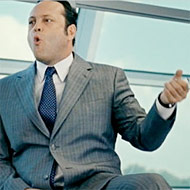
The trailer for The Dilemma has created quite the titular situation for its studio  bowing to pressure, Universal has removed Vince Vaughns line Electric cars are gay from the trailer, though the studio still hasnt excised it from the actual film  but the bigger problem may be the intractable straight pundits who dont understand the fuss. I wasnt offended by The Dilemmas gay joke, wrote L.A. Times columnist Patrick Goldstein this week, an assertion backed up by bloggers like David Poland (HOT Non-Issue about The Dilemma trailer  is stoopid, he tweeted), Hitfixs Drew McWeeny, and /Films Adam Quigley. Perhaps theyd understand the context around the controversy and the anti-gay tone of the trailer better if they knew that originally, the joke was supposed to be even worse.
In a posting on the Playlist, writer Oli Lyttelton alleges that in The DilemmaÔÇÖs script, the Vaughn character elaborates on his electric car line in a way thatÔÇÖs awfully revealing of the jokeÔÇÖs intent:
In Allan Loebs screenplay, dated a year ago, Vaughns character goes on to say Not homosexual gay  but soft gay, unmanly gay, quiet and small gay (in the trailer, the line was my-parents-are-chaperoning-the-dance gay) and that if youre a real man  you dont want an electronic car, which tries to swerve [around accusations of] homophobia while still taking the word as a slur, and at no point is he reprimanded for his stance by any other character.
Did Loeb and director Ron Howard decide to rewrite the line, or did they simply settle on an alternate take from the famously ad-libbing Vaughn? ItÔÇÖs hard to say, though the fact that a variation of the joke remained ÔÇö and even got pride-of-placement as the first line in the trailer ÔÇö means that the filmmakers either had no idea it would be perceived as homophobic, or simply didnÔÇÖt care. But homophobic it is, a fact clearly proven by the jokeÔÇÖs provenance as a cheap shot that twice asserts that gays arenÔÇÖt ÔÇ£real men.ÔÇØ
Many straight pundits are calling the controversy much ado about nothing simply because anti-gay jokes have long been so pervasive in entertainment. Goldstein took issue with CNN newsman Anderson Cooper, who kicked off the furor when he complained to Ellen DeGeneres that after a month of headlines dominated by gay teenagers killing themselves, ÔÇ£I was shocked that not only that they put [that joke] in the movie, but that they thought that it was okay to put that in a preview for the movie to get people to go and see it.ÔÇØ
ÔÇ£My first reaction was shock that Cooper was shocked,ÔÇØ Goldstein wrote. ÔÇ£After all, The DilemmaÔÇÖs gay gag hardly broke new ground. The Hangover, 2009ÔÇÖs biggest comedy hit, made a gay joke using a word so offensive that I canÔÇÖt repeat it here. In 2005ÔÇÖs The 40-Year-Old Virgin, Seth RogenÔÇÖs and Paul RuddÔÇÖs characters swap insults, calling each other gay for such cultural offenses as liking the band Coldplay and wearing macram├® jean shorts. Gay jokes are lobbed back and forth all the time on network TV and in comedy clubs.ÔÇØ
So  its okay then? What Goldstein misses is that each of his examples got blowback from the gay community when they were released, but without a spate of gay suicides or a high-profile newsmans comment to peg coverage to, those protests were virtually ignored by the media. Its akin to Eminem complaining this weekend on 60 Minutes that hes the only rapper regularly called out as homophobic: Is it because of the color of my skin? he asked rhetorically. Is it because of that youre paying more attention? Is it? Because theres certain rappers that do and say the same things that Im saying, and I dont hear no one saying anything about that. Then again, Eminem may not be listening very hard: Last year, dance-hall star Buju Banton saw his U.S. tour fall apart after months of concerted protesting from activists angered by his violently anti-gay lyrics.
Insiders at Universal claim that gay watchdog group GLAAD okayed the Dilemma trailer (letÔÇÖs disregard the fact that at this point, GLAAD exists mostly as a slow-to-act fund-raising apparatus that often gives major studios a pass on homophobia ÔÇö as they did with UniversalÔÇÖs similarly dunder-headed I Now Pronounce You Chuck and Larry ÔÇö in the hopes that those same studios will buy up expensive seats at GLAAD galas), an assertion the group disputes. But do we really need to rely on entities like GLAAD or journalists like Anderson Cooper to tell us that the Dilemma joke was misconceived? ShouldnÔÇÖt we ÔÇö and the filmmakers ÔÇö have known better from the start?
Hitfixs McWeeny (who found the joke to be somewhat generational  and the more you yell at someone about it, the less inclined theyre going to be to listen to what you have to say; never mind the fact that Coopers argument about the film was so calm and tame that he didnt even mention the movie by name), swatted down the furor, writing, I think this particular fire is out, Super Anderson Cooper. You can move along now. Let it go. Should we let it go, though? By now, youve probably heard of the video campaign to reach gay youth called It Gets Better. Lets hope it does, because if the Dilemma controversy and the reaction to it prove anything, weve still got a long way to go.

